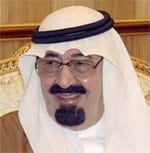 |
|
Saudi Arabia’s King Abdullah. |
Central bank governor Hamad Saud al-Sayyari was replaced with his deputy, Muhammad al-Jasser. The central bank, known as the Saudi Arabian Monetary Agency (SAMA), is not expected to make any big changes in monetary policy or management of foreign reserves under its new governor. SAMA has invested an estimated 85% of the kingdom’s estimated $500 billion of foreign reserves in dollar-denominated fixed-income securities.
Abdullah also dismissed Saleh al-Lohaidan, head of the supreme judicial council. As a result, the slow pace of reform of the country’s legal system, announced two years ago, could finally be speeded up.
The changes come at a time when Saudi Arabia, the world’s largest oil exporter, plans to run a budget deficit for the first time in seven years to keep the economy growing in the face of the global financial crisis and lower oil prices.
In neighboring Kuwait, the government announced a $5 billion bank rescue plan that will guarantee 50% of new loans provided to local companies. Kuwait’s banking sector has suffered significant losses as a result of the global financial crisis. Markets were expecting a larger rescue plan, according to analysts at Standard Chartered. They say fiscal spending needs to increase to pick up some of the slack in the economy. Previously, Kuwait’s finance minister, Mustafa al-Shimali, implied that spending would likely have to be cut in the fiscal year starting April 1, except for wages of government employees and capital spending for projects.
Gordon Platt



